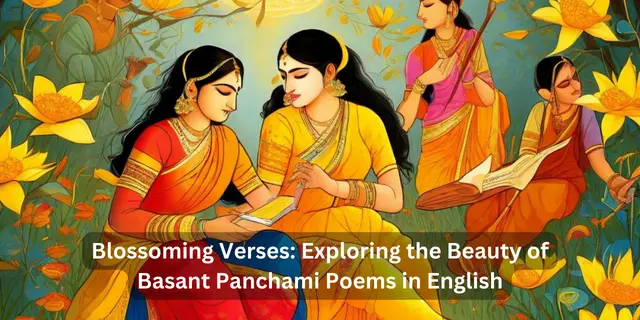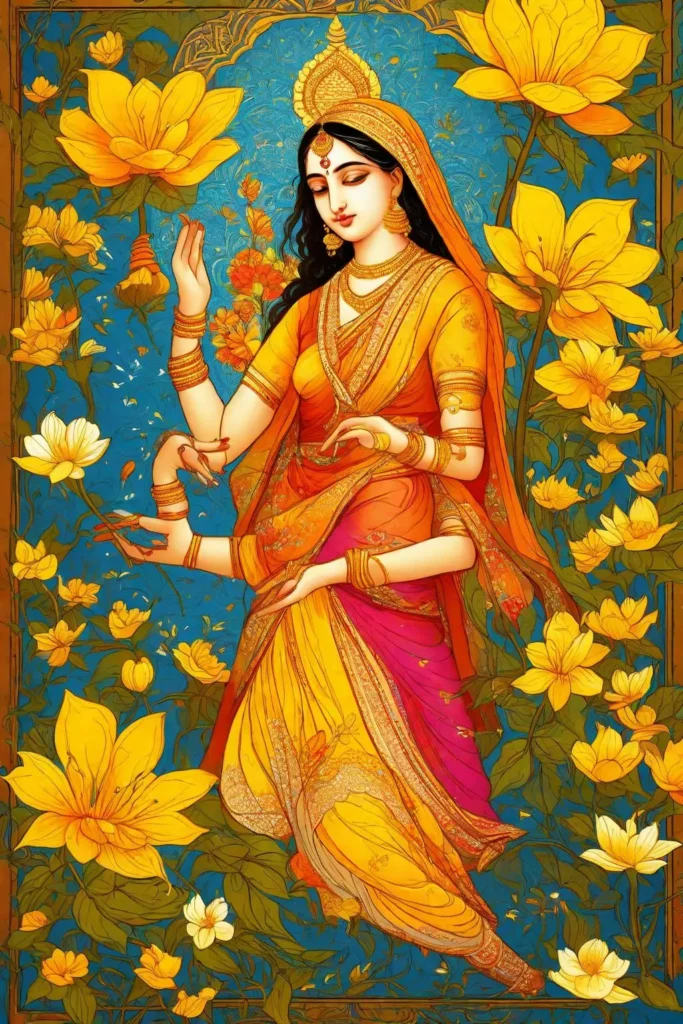Basant Panchami, also known as Vasant Panchami, marks the onset of the spring season in India. Celebrated with fervor and joy, this festival holds a special place in the hearts of many. Let’s delve into the rich tradition of Basant Panchami and explore the beauty of expressing this celebration through poetry.
History and Tradition

2.1 Origin of Basant Panchami
Basant Panchami finds its roots in Hindu mythology, associated with the worship of Goddess Saraswati, the deity of knowledge, wisdom, and art. The festival is believed to have originated during the Vedic period and holds cultural significance beyond religious boundaries.
2.2 Cultural Celebrations
Communities across India celebrate Basant Panchami with various cultural events, rituals, and vibrant displays of yellow, the color of mustard flowers that bloom during this season. The air is filled with excitement as people participate in traditional dances, music, and artistic expressions.
Basant Panchami Poems
3.1 Importance of Poetry in Celebrations
Poetry has always played a crucial role in expressing the emotions and cultural ethos associated with festivals. Basant Panchami poems, in particular, capture the essence of this vibrant celebration.
3.2 Themes of Basant Panchami Poems
Basant Panchami poems often revolve around themes of love, nature, and spiritual devotion. These themes reflect the joy of the season, the beauty of blooming flowers, and the spiritual significance of Goddess Saraswati.
Characteristics of a Basant Panchami Poem
4.1 Use of Nature Imagery
The beauty of Basant Panchami lies in its connection to nature. Poets often use vivid imagery of blooming flowers, singing birds, and the gentle breeze to create a sensory experience for the readers.
4.2 Emphasis on Yellow Color
Yellow, symbolizing prosperity and life, takes center stage in Basant Panchami poems. Poets use the color to evoke feelings of warmth, positivity, and the arrival of a new beginning.
4.3 Spiritual and Cultural Elements
Many Basant Panchami poems incorporate spiritual and cultural elements, paying homage to Goddess Saraswati. These elements add depth and a sense of sacredness to the poetic expressions.
Famous Basant Panchami Poets
5.1 Mirza Ghalib’s Contribution
Mirza Ghalib, the renowned Urdu and Persian poet, expressed his admiration for the beauty of spring in his works. His verses capture the romantic and melancholic aspects of Basant Panchami, showcasing the festival’s universal appeal.
5.2 Contemporary Poets and their Impact
Modern poets continue to contribute to the rich tapestry of Basant Panchami poetry. Their works reflect the evolving cultural landscape and provide new perspectives on the age-old celebration.
Exploring Basant Panchami Poem Themes
6.1 Love and Romance
Basant Panchami poems often explore the themes of love and romance, drawing parallels between the blossoming of flowers and the awakening of emotions. The festival becomes a muse for poets to celebrate the beauty of relationships.
6.2 Devotion to Goddess Saraswati
Devotional themes in Basant Panchami poems express reverence for Goddess Saraswati. Poets use their verses to seek blessings for knowledge, creativity, and the pursuit of higher wisdom.
6.3 Celebration of Spring
The overarching theme of Basant Panchami poems is the celebration of spring. Poets capture the vibrancy of the season, depicting the transformation of nature and the joyous atmosphere that accompanies it.
How to Write Your Basant Panchami Poem
7.1 Tips for Aspiring Poets
If you’re inspired to write your Basant Panchami poem, consider incorporating personal experiences, observations, and emotions into your verses. Let your creativity flow, capturing the essence of the festival in your unique voice.
7.2 Finding Inspiration
Nature, traditions, and the cultural significance of Basant Panchami can serve as potent sources of inspiration. Take a walk in a blooming garden, immerse yourself in the festivities, and let these experiences fuel your poetic imagination.
Basant Panchami Poem Examples
8.1 Classic Poems
Classic Basant Panchami poems, including those by Rabindranath Tagore and Allama Iqbal, continue to inspire generations. These timeless verses are a testament to the enduring beauty of the festival.

8.2 Modern Interpretations
Explore modern interpretations of Basant Panchami poems that reflect contemporary perspectives. Poets today use diverse styles and themes to capture the essence of the festival in the context of our rapidly changing world.
Impact on Education and Culture
9.1 Basant Panchami in Schools
Schools often celebrate Basant Panchami with special events and activities. The inclusion of poetry in educational programs helps students connect with the cultural and artistic aspects of the festival.
9.2 Cultural Relevance in Modern Times
While rooted in tradition, Basant Panchami and its poems remain culturally relevant in modern times. The festival serves as a bridge between the past and the present, fostering a sense of continuity and cultural pride.
DIY Basant Panchami Poetry Workshop
10.1 Engaging Activities
Organize a DIY Basant Panchami poetry workshop to encourage creative expression. Activities such as group discussions, writing prompts, and collaborative poetry creation can make the experience enjoyable for participants of all ages.
10.2 Fostering Creativity
Create a nurturing environment for creativity to flourish during the workshop. Provide participants with materials, guidance, and the freedom to explore their unique perspectives on Basant Panchami through poetry.
Basant Panchami Poem Competitions
11.1 Encouraging Participation
Basant Panchami poem competitions can be a fantastic way to encourage participation and discover hidden talents. Schools, communities, and cultural organizations can organize such events to celebrate the diversity of poetic expressions.
11.2 Recognizing Talent
Recognizing and rewarding talented poets in Basant Panchami competitions not only fosters a sense of accomplishment but also highlights the cultural significance of poetry in contemporary society.
Celebrating Basant Panchami in Different Regions
12.1 Regional Variations
Explore the diverse ways in which different regions celebrate Basant Panchami. From the grand festivities in North India to the unique traditions in South India, understanding these variations adds depth to the appreciation of the festival.
12.2 Unique Traditions
Learn about unique Basant Panchami traditions, such as kite flying in Punjab or special prayers in temples. Each region adds its own flavor to the celebration, creating a mosaic of cultural diversity.
The Evolution of Basant Panchami Poems
13.1 Traditional vs. Contemporary Themes
Examine the evolution of Basant Panchami poems, from traditional themes rooted in mythology to contemporary expressions influenced by modern lifestyles. This evolution reflects the dynamic nature of culture and artistic expression.
13.2 Influence of Globalization
Globalization has brought Basant Panchami to a broader audience. Explore how the festival and its poems resonate with people from different backgrounds, contributing to a global appreciation of cultural diversity.
Basant Panchami Poem: A Source of Inspiration
14.1 Connecting Generations
Basant Panchami poems serve as a bridge between generations, connecting the past with the present. The timeless themes and cultural richness in these poems inspire individuals of all ages to appreciate the beauty of the festival.
14.2 Perpetuating Cultural Heritage
The continued creation and appreciation of Basant Panchami poems contribute to the perpetuation of cultural heritage. In a rapidly changing world, these poetic expressions become valuable treasures that link us to our roots.
Read More: Basant Panchami Poem in English
Conclusion
In conclusion, Basant Panchami poems encapsulate the spirit of the festival, celebrating the beauty of nature, the joy of spring, and the reverence for knowledge. As poets continue to weave their verses, the timeless tradition of expressing Basant Panchami through poetry remains a source of inspiration for generations to come.
Share With Your Friends